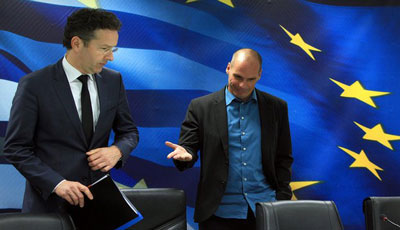Greece crisis: Emergency summit called for Monday

An emergency summit of leaders from eurozone nations will be held on Monday, after the latest attempt to resolve the Greek debt crisis failed.
A meeting of finance ministers on Thursday made no breakthrough.
Head of the Eurogroup, Jeroen Dijsselbloem, said that “too little” progress had been made and that “no agreement as yet is in sight”.
Greece has less than two weeks to strike a deal with its creditors or face defaulting on an existing loan.
Mr Dijsselbloem stressed that “very little time remains” for Greece.
Reports say that the European Central Bank (ECB) will hold an emergency meeting of its governing council on Friday to discuss the deteriorating situation for Greek banks.
It is thought that the ECB may have to extend further emergency funding for Greek banks which have suffered high rates of withdrawals by customers worried that Greece could be forced out of the eurozone.
‘Gigantic adjustment’
On Thursday Greek Finance Minister Yanis Varoufakis said his nation had presented a “comprehensive” proposal and that disagreement only existed over spending equivalent to 0.5% of Greek GDP, which he says does not constitute a “dangerous impasse”.
He argued that Greece had already made a “gigantic adjustment” over the past five years and rejected any measures that would “jack-up” taxes and reduce benefits further.
And he warned that negotiations were “dangerously close to a state of mind that accepts an accident”.
Greece has less than two weeks remaining to strike a deal or face defaulting on an existing €1.6bn (£1.1bn) loan repayment due to the International Monetary Fund.
The country has already rolled a €300m payment into those due on 30 June.
If it fails to make the payment, it risks having to leave the eurozone and possibly also the EU.
But the European Commission, the IMF and the ECB are unwilling to unlock bailout funds until Greece agrees to reforms.
They want Greece to implement a series of economic changes in areas such as pensions, VAT and on the budget surplus before releasing €7.2bn of funds, which have been delayed since February.
Mr Dijsselbloem called on Greece to submit “credible” proposals in the coming days and said the nation needed to seize a “last opportunity” to reach a deal with its creditors.
“It is still possible to find an agreement and extend the current programme before the end of the month, but the ball is clearly in the Greek court to seize that last opportunity,” Mr Dijsselbloem said.
Greece – deal or no deal?
- Option 1: No deal: Greece defaults on IMF and ECB repayments; ECB pulls plug on emergency bank assistance leading to run on Greek banks, capital controls and potential Grexit
- Option 2: Greece agrees reform deal with creditors at last minute and avoids default, staying in euro
- Option 3: No deal reached but both sides paper over cracks and Greece stays in euro for now
Pressure was also raised on Greece earlier on Thursday when the boss of the IMF, Christine Lagarde, warned there was “no period of grace” for Greece over its impending debt repayment deadline.
She said Greece would be in default on its loans from the IMF if it failed to make the €1.6bn payment on 30 June.
Ms Lagarde maintained that the international institutions had always shown flexibility towards Greece’s situation.
‘Commitments’
Earlier German Chancellor Angela Merkel said she was “still convinced” that a Greek debt deal was possible.
In her statement to the German parliament, Mrs Merkel said Germany was working hard to keep Greece in the euro, but said Athens had to follow through on reform commitments.
“I’m still convinced – where there’s a will, there’s a way,” she said. “If those in charge in Greece can muster the will, an agreement with the three institutions is still possible.”
In another development, Greek Prime Minister Alexis Tsipras denied allegations that elderly Greeks were receiving lavish pensions.
Writing in the German newspaper Der Tagesspiegel, he said: “The problem is not one of supposed generous pensions. The most significant disruption to the pension funds is due to dramatically lower revenues in recent years.
“These were caused by… the sharp drop in contributions that resulted from soaring unemployment and the reduction in wages.”
Greek debt talks: main sticking points
- Greece will not accept cuts to pension payments or public sector wages, saying two-thirds of pensioners are either below or near the poverty line
- International creditors want pension spending cut by 1% of GDP – it accounts for 16% of Greek GDP. They say their target is early retirement not individual pensions
- EU officials say Greece has agreed to budget surplus targets of 1% of GDP this year, followed by 2% in 2016 and 3.5% by 2018. Greece says nothing is agreed until everything is agreed
- Creditors also want a wider VAT base; Greece says it will not allow extra VAT on medicines or electricity bills
- Greece complains creditors focus on increasing taxes instead of cracking down on tax evasion; IMF is concerned Athens is not offering credible reforms
Source: BBC – Greece crisis: Emergency summit called for Monday




























